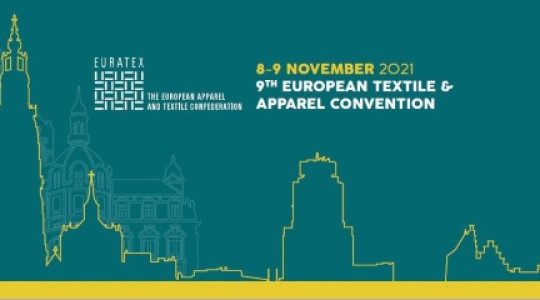Nieuwsbericht
10 take-aways from the Antwerp Convention
12-11-2021 - Without wishing to disparage other speakers, it was impossible to follow all parallel sessions, these are 10 of the remarks that I wrote down during the IAF- and Euratex Convention last week. Quotes are not literal, topics may be combined and the interpretation is personal. What struck me both days were the practicality and actuality of the contributions. All 10 points apply today.
- If you want innovation, sustainability, living wages, then PAY for it. (Miran Ali, BGMEA)
The same discussion is going on in the Climat top COP26: policy and society versus buying power. It is the call for fair buying practices IAF is working on it in the STTI project with the Star Network and others, sustained by GIZ, the German RvO.
- The apparel and textiles sector play a most important role in economic recovery. Millions of people, including many women, migrants and youngsters depend on the hundreds of thousands of SME’s in these industries. People should be central. Technology will not replace jobs, but only enable better conditions. (Ryder, ILO)
- High inventories and sustainability do not match. We need to move from high volumes and low prices to value for money and healthy margins. Earning more money from less product and efficiency and a fair share through the supply chain will bring sustainability closer and prices fair for everyone including the consumer. Share the risks, instead of minimising costs. (Thorbeck, Chainge Capital)
- E-Fashion is not about being vertically organised, but about taking responsibility. Again, bring down inventory risks and produce smaller batches, especially in the luxury markets (Ballentine, Fox River Mills). You might add here that producing and selling a piece one time is nice but taking back good stuff and reselling it again second hand as a brand, or even for a third time, is most profitable (Potenzone, K3).
- Brands who wait for legislation to then become “sustainable” are too late (Potenzone, K3). Take faith in your own hands, keep changing and don’t wait for politicians to tell you what to do, but engage in the process. Don’t rely on the “level playing field” but help setting the rules.
- If you want to get young people into your company, especially in IT, then be prepared for change. Millennials are not coming for the history but for the future. They will want to change your company and not only impose change on others in the supply chains. (Potenzone, K3). The problem is not schools teaching the wrong methods, it’s about companies wanting to stick to old-school business (Gerards, Master Tailor Institute).
- Ten cents extra for sustainable fibres in a production price of 10 dollars is considered too much for a pair of jeans selling 200 dollars retail (Van de Kerkhof, Lenzing). By 2050 we must have replaced all synthetics and given the low rate of growth of use of natural fibres, this starts tomorrow (Scheffer, WUR).
- Save your clients their time, instead of saving your own time (Pedrosa Rodrigues). There is still a lot to win by efficiency if you share knowledge and risks. Consumption will rise because populations and with them consumption does but understanding the process upstream and investing in machines can reduce pollution by chemicals and use of energy and water.
- Traceability is not the same as transparency (Pisani, UNECE). What you trace and map internally, does not always have to be communicated externally. There is a big IP issue here of companies keeping their recipes to themselves (discussion from the floor). A small percentage of companies rule the other large number of suppling SME’s. The latter companies may be forced to NON-transparency, to stay alive. Therefor keep in mind that traceability is like technology, it should serve a goal: create a change and positive impact over time in collaboration within the supply chain (Plugge, SIM).
- EU financial programs are complicated. It’s the Champions league (Walter, ETP). You must be very professional and dedicated to get research funded. Your chances of winning are small, it’s the European Dream. But don’t give up after the first round.
More to read (in dutch)
Twee tools voor verantwoord ondernemen
ACM zet campagne tegen misleidende duurzaamheidsclaims in kledingsector voort
For information about special topics or talks, contact me at Modint.
Rens Tap


